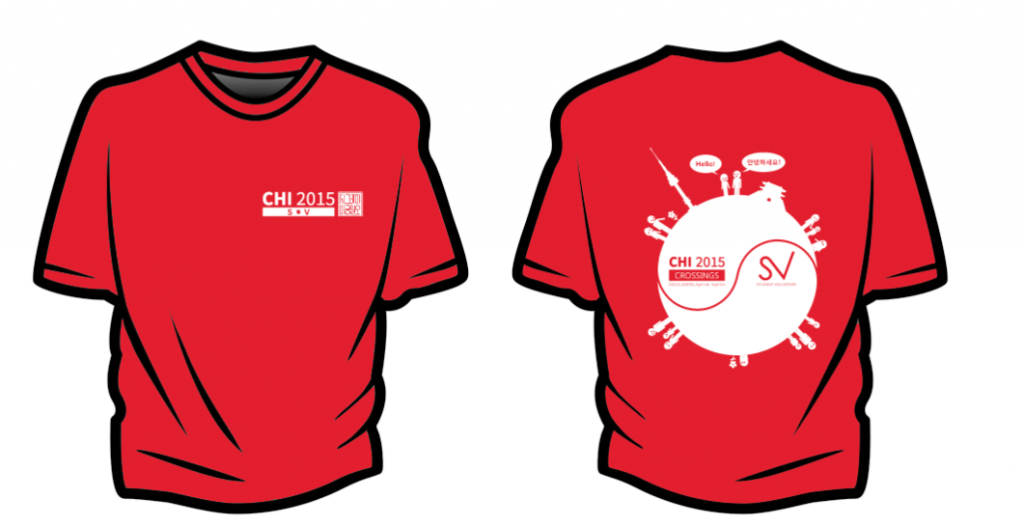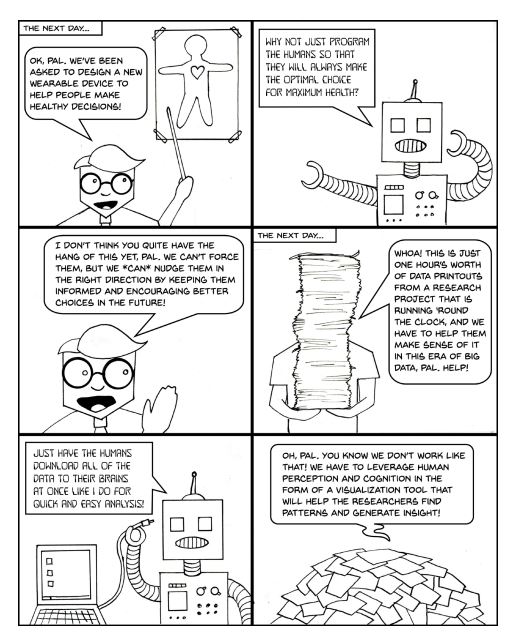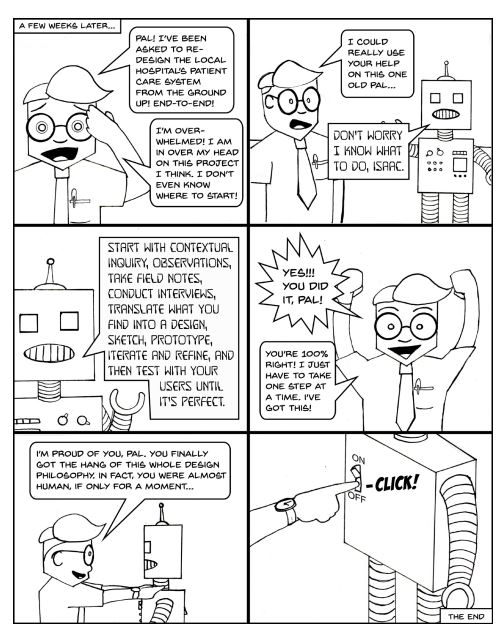HDS lab member, Ray Hong, will present a talk titled, “Improving Game Experiences” at the 2015 ACM Conference on Human Factors in Computing Systems (CHI) in Seoul, Korea. Hong will present empirical data on the usability and usefulness of the Vizmo prototype, a new way of browsing video games based on their visual style and mood. The CHI talk is based on a paper title “VIZMO Game Browser: Accessing Video Games by Visual Style and Mood,” co-authored by Jin Ha Lee, Sungsoo (Ray) Hong, Hyerim Cho, and Yea-Seul Kim. More about Vizmo can be found here: http://vizmo.mooo.com/.
News
News / Comments Off on HDS member, Ray Hong, to present at CHI 2015
News / Comments Off on HDS grad students recognized for excellence in HCDE
Two members of the Human-Centered Data Science Lab have been recognized for their outstanding contributions to Human Centered Design and Engineering. Daniel Perry received the 2015 HCDE Student Innovator Award for Research, and Taylor Scott received the 2015 HCDE Student Innovator Award for Teaching. Recipients of the departmental Innovator Awards are in turn nominated for the College of Engineering’s Community of Innovators Awards, which will be announced in May 2015.
News / Comments Off on Cecilia Aragon Presents at AAAS Symposium on the Human Side of Data Science
Lab Director and HCDE Professor Cecilia Aragon presented at the American Association for the Advancement of Science’s annual meeting in San Jose, California on Feb. 15th. In a talk titled “Future Career Paths for Data Scientists in Academia,” she addressed the human dimensions of data science that will be important for academic careers in the field. The talk was part of a larger session titled “Advancing University Career Paths in Interdisciplinary Data-Intensive Science,” led by University of Washington faculty, as well as additional members of the five-year Moore/Sloan data science initiative from UC Berkeley, and New York University.
An article about the presentation was recently featured in UW Today: http://www.washington.edu/
News / Comments Off on Research on Bilinguals Use of Emoticons Presented at AAAS
Research conducted by Lab Director Cecilia Aragon and HCDE PhD Student Nan-Chen Chen was recently presented in a talk at the American Association for the Advancement of Science’s annual meeting in San Jose, California on Feb. 14th. Aragon presented their findings as part of a larger symposium on “Social, Emotional, and Cognitive Bases of Communication: New Analytic Approaches.” In the research Aragon and Chen analyzed chat logs from astrophysicists collaborating in the U.S. and France, finding that native French speakers in the scientific collaboration used more emoticons when they communicated in English. Their findings have implications for how bilinguals use emoticons to assist in communication when wording or phrasing might be challenging.
An article on the research was recently featured in UW Today: http://www.washington.edu/news/2015/02/13/aaas-talk-some-bilinguals-use-emoticons-more-when-chatting-in-non-native-language/
News / Comments Off on Ray Hong Wins CHI 2015 Student Design Competition
HDS Lab member, and 3rd year HCDE PhD student Ray Hong recently won the design competition for the 2015 Computer Human Interaction (CHI) Conference Student Volunteer T-Shirts. Ray’s design won out over thirty submissions to represent the student volunteers at the CHI Conference in Seoul, South Korea in mid-April of this year.
The winning design (below) features the Republic of Korea flag, and a globe with Seoul’s major landmarks, including the Kwanghawmun gate and the N Seoul Tower. The design integrates the conference theme of “Crossings” by showing people around the globe crossing each other to say hello in English and Korean, sharing cross-cultural knowledge. Congratulations Ray!


News / Comments Off on Taylor Scott Nominated for Excellence in Teaching Award
Taylor Jackson Scott, 4th year PhD student in the HCDE department and HDS Lab member, was recently nominated for the annual university-wide Excellence in Teaching Award for his outstanding contributions to the University of Washington and the department of Human-Centered Design and Engineering as both an instructor and teaching assistant. In his time at the UW, Taylor has worked closely with faculty and staff to foster creative and innovative learning environments for seven different courses, while serving as a mentor and collaborator to students progressing through the undergraduate and graduate degree programs. He is currently the instructor for HCDE 411 Information Visualization where he teaches undergraduate students the fundamentals of visualization for use across a wide variety of disciplines. Asked about the nomination, he noted, “I am incredibly honored to be considered for the award, and grateful to those that have helped me along the way.” The winners of the award are expected to be announced in the Spring quarter of 2015. Way to go Taylor!
News / Comments Off on Katie Kuksenok’s Article on Social Media in Ukraine Shared on Medium
Katie Kuksenok, SCC lab member and CSE PhD student, recently shared an article titled Hope, Lies & The Internet: Social Media in Ukraine’s Maidan Movement on the online journalism platform Medium. Kuksenok was a visiting scholar at the Central European University Center for Media, Data, and Society this past year, conducting research in Kyiv on online activism campaigns, and multilingualism in social media, connected to the Maidan movement.

Image from Hope, Lies & The Internet: Social Media in Ukraine’s Maidan Movement by K. Kuksenok on Medium
When asked about the effects of social media on political movements, Kuksenok notes that “a political movement is a physical phenomenon, not just an online one. Real-world action and discussion is the critical outcome, not the virtual interaction that helps organize or inform. Measuring online activity, the numbers of Likes and Shares, is a truly tiny fragment of the picture. A video shared on social networks, created by journalists, re-appropriated by individuals engaged in truth-finding campaigns has an impact not because of how much it is Liked and Shared, but because it gained critical mass and became a catalyst for discussion beyond the technology.”
The article is an introduction to the role of social media in the Maidan movement. The intersection of multilingualism and online engagement will be the subject of her contribution at the upcoming international SOYUZ meeting on post-socialist studies.
The entire article Hope, Lies & The Internet: Social Media in Ukraine’s Maidan Movement by K. Kuksenok can be read on Medium: https://medium.com/what-about/
News / Comments Off on Taylor Scott’s HCDE Inspired Comic ‘Not Quite Human’ in UW Today
What can a life-sized robot named Pal teach us about human centered design methods? Apparently quite a bit when interacting with its creator in the comic strip Not Quite Human, authored by lab member and HCDE PhD student Taylor Scott. The comic was borne out of HCDE professor Charlotte’s Lee’s directed research group Comics Made by You: HCDE for Everyone, which seeks to make the topic of HCDE accessible to a broader audience through the use of comics. Scott’s work was recently featured in a UW Today article about the class. Great work Taylor! We can’t wait to read more of Pal’s future adventures.
The UW Today article: http://www.washington.edu/news/2014/12/01/what-is-hcde-new-comics-class-aims-to-answer-the-question/


News / Comments Off on Lab Director Cecilia Aragon Receives Award for Data Management Project
SCC Lab Director and HCDE Professor Cecilia Aragon and collaborators at Lawrence Berkeley National Lab recently received a $300K award from the US Department of Energy to research and develop tools for improving scientific workflows and the use of massive supercomputers. The project, Usable Data Abstractions for Next-Generation Scientific Workflows, will utilize user-centered design processes and an ethnographic approach to study the hardware and software tools used to harness large scale scientific data. The project will initially focus on the climate sciences and combustion physics.
A further description of the project can be found on the Lawrence Berkeley National Lab website.
News / Comments Off on SCCL Members Attend Data Science Environment Summit



